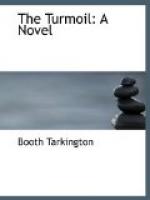“You’re showing me the town,” he said. “I didn’t know what was in it at all.”
“There are workers in beauty here,” she told him, gently. “There are other painters more prosperous than my friend. There are all sorts of things.”
“I didn’t know.”
“No. Since the town began growing so great that it called itself ‘greater,’ one could live here all one’s life and know only the side of it that shows.”
“The beauty-workers seem buried very deep,” said Bibbs. “And I imagine that your friend who makes the smoke beautiful must be buried deepest of all. My father loves the smoke, but I can’t imagine his buying one of your friend’s pictures. He’d buy the ‘Bay of Naples,’ but he wouldn’t get one of those. He’d think smoke in a picture was horrible—unless he could use it for an advertisement.”
“Yes,” she said, thoughtfully. “And really he’s the town. They are buried pretty deep, it seems, sometimes, Bibbs.”
“And yet it’s all wonderful,” he said. “It’s wonderful to me.”
“You mean the town is wonderful to you?”
“Yes, because everything is, since you called me your friend. The city is only a rumble on the horizon for me. It can’t come any closer than the horizon so long as you let me see you standing by my old zinc-eater all day long, helping me. Mary—” He stopped with a gasp. “That’s the first time I’ve called you ’Mary’!”
“Yes.” She laughed, a little tremuously. “Though I wanted you to!”
“I said it without thinking. It must be because you came there to walk home with me. That must be it.”
“Women like to have things said,” Mary informed him, her tremulous laughter continuing. “Were you glad I came for you?”
“No—not ‘glad.’ I felt as if I were being carried straight up and up and up—over the clouds. I feel like that still. I think I’m that way most of the time. I wonder what I was like before I knew you. The person I was then seems to have been somebody else, not Bibbs Sheridan at all. It seems long, long ago. I was gloomy and sickly —somebody else—somebody I don’t understand now, a coward afraid of shadows—afraid of things that didn’t exist—afraid of my old zinc-eater! And now I’m only afraid of what might change anything.”
She was silent a moment, and then, “You’re happy, Bibbs?” she asked.
“Ah, don’t you see?” he cried. “I want it to last for a thousand, thousand years, just as it is! You’ve made me so rich, I’m a miser. I wouldn’t have one thing different—nothing, nothing!”
“Dear Bibbs!” she said, and laughed happily.




